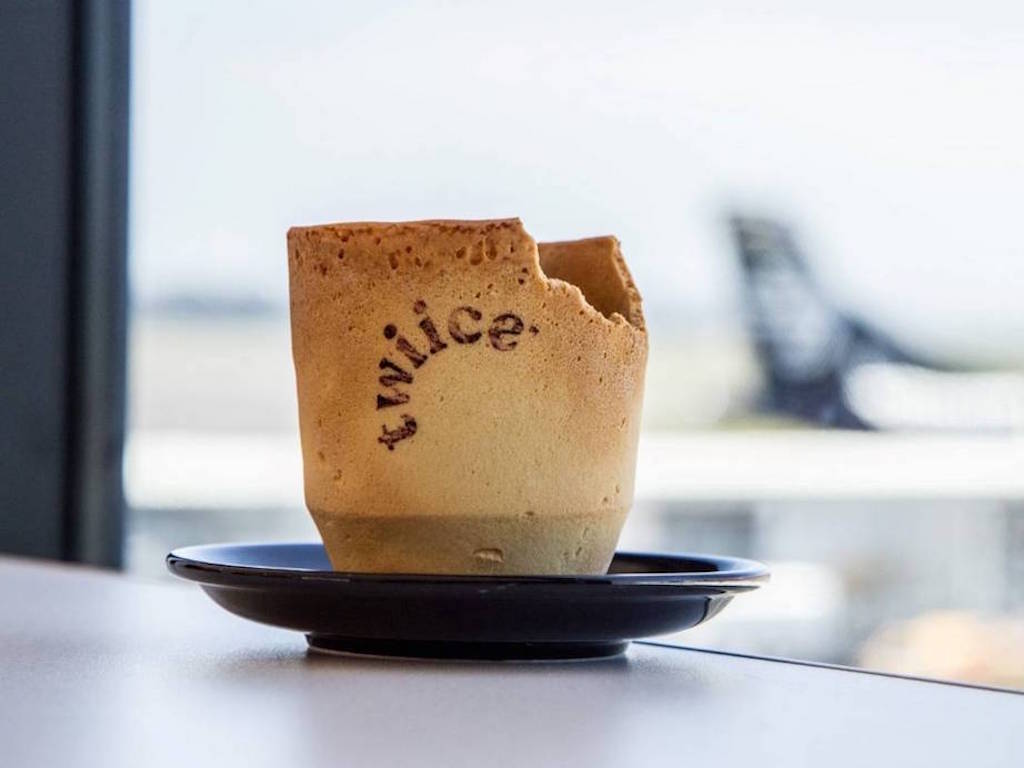3 Mins Read
Air New Zealand is now trialling an edible biscotti coffee cup made by family-run startup Twiice on select flights and lounges in a bid to make their operations more eco-friendly. The “zero-waste” move comes at a time when consumers are asking for sustainable alternatives amid awareness builds regarding environmental impact of single-use disposable cups, and are becoming more savvy in detecting greenwashing in products and brands marketed as sustainable.
Air New Zealand, the flag carrier line of New Zealand, has just begun using edible biscotti coffee cups in collaboration with Auckland-based startup Twiice on a trial basis in select flights and lounges. The campaign aims to reduce the astonishing 600 billion non-biodegradable single-use disposable coffee cups used globally that end up landfilled every year, with hardly any being recyclable or collected for recycling. While the airline’s current cups are compostable, they still end up as waste once the drink has been finished.
With this initiative, passengers can eat the leakproof vanilla-flavoured cup, instead of tossing it in the bin. However, because Twiice’s cups are made from wheat flour, sugar, egg, vanilla essence and natural vanilla flavour, it is unsuitable for vegans and those with gluten intolerances. With the trial, the airline hopes to move towards eliminating all disposable items throughout their operations.
Commenting on the trial, the airline’s senior manager of customer experience Niki Chave said: “We’ve been working in partnership with [Twiice] to explore the future of edible coffee cups…The cups have been a big hit with the customers who have used these, and we’ve also been using the cups as dessert bowls.”
Twiice is not the only edible cup on the market – Bulgarian-based startup Cupffee has created an edible coffee cup too. Cupffee’s heat-resistant edible cup is made with only natural non-GMO grain ingredients, making it vegan-friendly, though it is still not gluten-free.
Other companies have brought the edible into straws rather than cups, such as RiceStraws by Malaysian-based startup NLYTech Biotech. As the name suggests, RiceStraws are made out of rice, as well as the coagulating plant ingredient tapioca, which makes it vegan-friendly and is Halal-certified. According to the company, rice straws are not only better for the planet when compared to plastic disposable ones, but other eco-friendly alternatives too as they do not contain polylactic acid (PLA), a common ingredient in bioplastic and paper straws.
Part of the attraction of edible foodware and cups as a zero-waste solution has been driven by sharper consumers who are more attuned to examples of greenwashing, while the market becomes saturated with “eco”-marketed products launched by companies keen to capitalise on the trend. The bamboo fibre cup, for instance, has become a much applauded replacement to disposable coffee cups, but research has found that almost all popular bamboo cup brands contain toxic melamine resin, a problematic substance from both a health and environmental perspective.
A more recent American startup, Unocup, has created a spill-and-leak-proof foldable paper coffee cup that requires no lid, but while the prototype has been praised by many, their first batch will still use the same material as standard paper cups, which means it remains uncompostable.
Lead image courtesy of Air New Zealand / Twiice.




